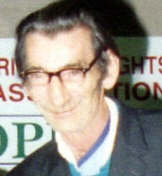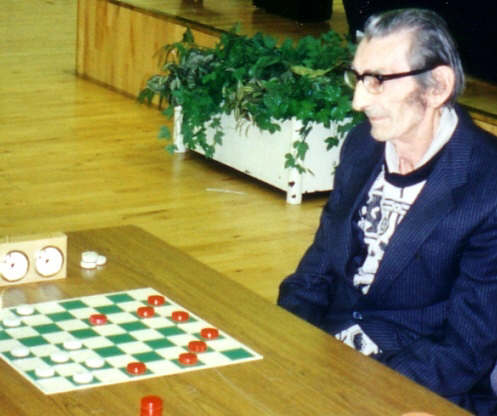The Checker Maven
Jump to navigationMr. Bill Edwards: Grandmaster from Wales
The Checker Maven is pleased to present the following article about the late Welsh Grandmaster Bill Edwards. The article was written by Mr. Edwards' son, Lindus, himself a Grandmaster.
William (Bill) Edwards was born on the 28th January 1915 in the small coal-mining village of Penrhiwceiber, South Wales. At the age of twelve his father, John, taught him the rudiments of checkers, paying the youngster a penny for each elementary problem he could solve. Within a few months young Edwards accumulated a harvest of pennies and with it an interest to improve in playing strength.
At the age of fifteen his father introduced him to a local club wherein he met a dozen or so players of expert level, one of whom was the gifted crossboard player William Morgan who took the precocious youngster under his wing for several years. Morgan’s fine tuition evidently reaped a great reward when Bill, at the age of just nineteen, won the Glamorgan Open Championship without the loss of a single game in a tournament which attracted the top Welsh players of the day.
Only a few weeks after this impressive performance a serious coal-mining accident crushed Bill’s left foot causing him to be hospitalised for several months and removed him from the checker-playing scene for the next three years until he decided to enter his first Welsh Open Championship. With only a month to prepare he managed to win this prestigious event ahead of such notables as Graham Davies (later to become the British Open Champion), Alf Huggins (also later to become the British Open Champion and World Correspondence Champion), Ivor Edwards (unrelated) and Ernie Rees to name but four among many players of grandmaster strength.
Following several additional major victories Bill joined the Royal Engineers and distinguished himself by being invalided out of the army after a six-year tour of duty in World War Two.

Mr. Bill Edwards, circa 1950
With hardly any preparation Bill entered the English Open Championship in 1948 where he met and befriended the legendary Derek Oldbury. It was only in the final that Bill succumbed to the phenomenally strong crossboard player Percy Crabbe. But not without incident. This was a final now made famous by the incompetence of the time-keeper who announced that Bill needed to make eighteen moves in the two remaining minutes when, in fact, only two moves were required! Attempting to play the required number of moves in so short a time proved fatal with Crabbe capitalising upon an understandable blunder.
Following three more Welsh Championships victories between 1953 and 1955 Bill decided upon permanent retirement from the game and married shortly after.
During the winter of 1971 I discovered some old documents in the attic which revealed the illustrious checker-playing career of my father which, hitherto, he had only briefly talked about. Intrigued by his past I asked whether his interest might be rekindled to the extent of playing in another tournament, at which point he seemed dubious. Within a day or so I bought a checker board and pieces as I was desirous of seeing how skilful he was! To my astonishment I was shown an entirely different game to the one I knew as a small child and wanted, quite naturally, to learn more. Having a checker board and pieces before him for the first time in sixteen years must have served as the catalyst in his comeback, for it was only a few days later that my father and I visited Cardiff YMCA – the scene of many Welsh Championships - in pursuit of meeting the players whose skills had graced that wonderful Victorian building.
After an hour’s wait two gentlemen in their late eighties walked into the room. My father strode up to them and extended his hand as if the many years which separated their last meeting meant nothing. “Bill Edwards!” exclaimed the older of the two. “And you are my old friends Steve James and Stan Bassett,” replied my father. I looked on stupefied and said, “Now I see why checker players have to have such great memories!”
Within a couple of months of that memorable meeting my father began to study such books as ‘World Championship Checkers’ and as many others containing the games of his idol, Dr Marion Tinsley, as possible.
In May of that year my father decided to enter the British Open Championship in North Wales. By a remarkable coincidence, Graham Davies of South Wales was also making a comeback to the game after an almost equally long period.
After eleven gruelling sessions and twenty-two games Graham Davies emerged the winner of that contest with 15 wins and no losses – just ahead of my father who scored 12 wins and no losses.
A year later, and now armed with a knowledge of three-move play which, hitherto he had never studied, Bill won the Scottish Open Championship ahead of John McGill, Tom Watson, James Marshall and Jimmy Grant.

Winner of the 1987 Irish Open
Bill’s golden years were between 1979 and 1987 during which time he won five consecutive English Open Championships, together with several major freestyle tournaments.
When Bill played in the United States-United Kingdom International Match of 1989 he won seven wins out of the eleven managed by the entire UK & Ireland team. When one considers that only five wins were scored in the one hundred and eighty games played by the other nine team members, it makes one realise how strong a player my late father was. In that contest Bill scored two draws with Asa Long and beat the likes of Paul Davies, but it was at a time when he was almost at the peak of his ability.
In 1994 Bill journeyed to Scotland and won the Centenary Scottish Open Championship. Winning this event persuaded him to continue playing in spite of declining health and in 1995, at the age of eighty, he won the British Open Championship without the loss of a single game ahead of Pat McCarthy, Tom Watson and several other notable grandmasters.

At the 1997 English Open
Following this astonishing success he decided to issue a challenge for three-move championship of the world. At the age of eighty-one and in rapidly deteriorating health Bill journeyed unaccompanied to Ireland in an ill-advised attempt to wrest the title from Ron King of Barbados. Being provided with an inadequately heated room in a sub-standard hotel, whilst Ron King enjoyed the sumptuous comfort of a five-star hotel across the road, did nothing to enhance his chances of winning the match, to say the least of the appalling toll on his health. Seeing his deterioration in health the kindly manager of the hotel at which Ron King was cordially treated in the lap of luxury took pity upon the octogenarian and insisted he stay at his hotel free of charge.
With thoughts of returning home as quickly as possible Bill Edwards, the man who had won almost thirty major championships, not surprisingly played the poorest checkers of his life.
With literally only weeks to live, in chronically poor health and suffering great pain, Bill attempted to win the Droitwich Open, which is a twelve-round freestyle event over a weekend, and was forced to withdraw after only a few sessions, but not before winning his last game with a magnificent touch so typical of his wonderful crossboard ability.
As a player my father was blessed with a phenomenal memory, often memorising dozens of games daily and retaining them for use in tournaments years later! It was not by memory alone however that he was able to defeat the finest players of Great Britain and Ireland over almost thirty years. His crossboard skills were of the highest order, often visualising twenty-five moves in the most complicated positions. I tested this ability on countless occasions, often presenting him with the most convoluted positions imaginable. The outcome was always the same.
After a couple of minutes he would say, “Yes, I can see it now. The piece on square twenty-seven will be lost in twenty-four moves!”
As a person he was liked instantly by all who met him. He exuded a calm at the checker board such as I have never seen and was a quality which undoubtedly assisted him to win a unique number of major tournaments.
Moving a piece on a checker board was something he did with an elegant style and was sheer poetry in motion to behold. Always modest in success and congratulatory to the few who beat him Bill will be remembered not only as the greatest Welsh player to date, but as a person with a big heart who loved everyone.
William “Bill” Edwards died peacefully at Prince Charles Hospital, Merthyr Tydfil, South Wales, during the early hours of Thursday the 23rd July 1998 aged eighty-four years.
Only hours before his passing he asked me how the British Open Championship was progressing–- an indisputable testimony to his deep love of checkers. Pat McCarthy was to later write to me saying, “Your father’s play had a touch of genius about it.” Coming from a player my father regarded as a phenomenal crossboard player this was a fine eulogy indeed.
---Lindus John Edwards.

Penrhiwceiber, Village of Mr. Edwards' Birth
Here is a game played by Mr. Edwards in the 1982 British Championships in which he defeats the legendary Derek Oldbury. Annotations are by Lindus Edwards.
1982 British Championship Match
Edwards: Black
Oldbury: White
| 10-15 | 24-20 |
| 7-10 | 28-24 |
| 3-7 | 23-19 |
| 9-14 | 22-17 |
| 5-9 | 17-13 |
| 15-18 | 26-23 |
| 1-5 | 31-26 |
| 11-16 | 20-11 |
| 8-15 | 26-22 |
| 4-8 | 21-17---A |
| 14-21 | 23-14 |
| 10-26 | 19-3---B |
| 9-14 | 30-23 |
| 21-30 | 32-28 |
| 8-11 | 23-19?---C |
| 11-16 | 19-15 |
| 16-20 | 15-11 |
| 14-18 | 3-8 |
| 6-9 | 13-6 |
| 2-9 | 11-7 |
| 30-26 | 8-11 |
| 26-23 | 7-2 |
| 23-32 | 11-15 |
| 20-27 | 15-22---D |
| 27-31 | 2-6 |
| 9-13 | 29-25 |
| 32-27 | 6-10 |
| 27-23 | 25-21 |
| 12-16 | 10-14 |
| 16-19 | 14-10 |
| 23-27 | 10-7 |
| 19-23---E | Black Wins |
A---Or 22-17 as played by Newell Banks vs. Marion Tinsley as follows: 8-11, 25-22, 18-25, 29-22, 11-16, 22-18, 15-22, 19-15, 10-28, then either 17-1 (Tinsley-Banks) or 17-3 (Tinsley-Hellman).
B---19-1 is the better way.
C---This permits 11-16 and places the piece on 27 in jeopardy. Instead, 24-20 11-15, 27-24, 30-26, 23-19, 6-10, 29-25 Drawn. D. E. Oldbury vs. E. Frazier, 1965 match.
D---"There are other man-down ideas that might have been tried, but to no avail" (DEO).
E---A nicely played win.![]()
You can email the Webmaster with comments on this article.
